|
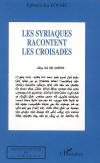
A Syriac tale of Crusades
Three Syriac chroniclers had narrated Crusades in their
own language, which was Syriac, an dialect from Aramaic. Syriac communities
did assist to the destruction, by armies, of many towns and cities
in Syria and Upper Mesopotamia, and their situation was weakened.
Michael
the great, the Anonymous Edessenian, Bar Hebraeus offered us original
and unique writings, that reflected a different and less partial vision
of events, in a care of justice and truth. Their own vision sometimes
differs from Latin, Byzantine and Arab chroniclers.
These
chroniclers lived during a troubled era and were the witnesses of
the major events happened in Syria-Palestine, between the XIth and
XIIIth century. These exploits had still a passionate echo
in current public opinion.
After
the reading of a such book, many prejudices and bias points of view
will disappear, as other facts would be discovered.
Chronicle
of Mesopotamia
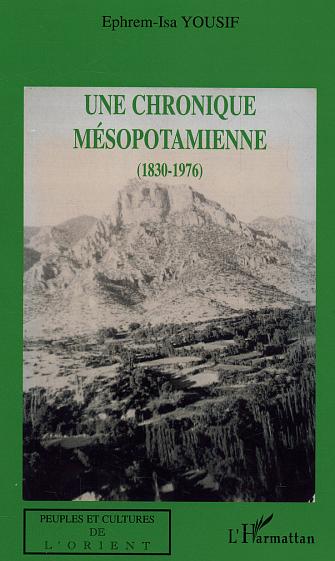 In
this chronicle, the writer choses to report all the period from 1830
to1976. He draw for us politic, social and religious events of Mesopotamia
: a history marked with conflicts, joys ans pains. During a long time
the land was a part of the Ottoman Empire and later of Iraq. From
the top of their moutainous Assyrian-Chaldean village, Sanate, three
generations of dwellers watched the ebb and flow of History : Grand-Mother,
Father and the Son. They report the facts according to their own sensibility,
shared with us their impressions and brought an original vision of
world and life. In
this chronicle, the writer choses to report all the period from 1830
to1976. He draw for us politic, social and religious events of Mesopotamia
: a history marked with conflicts, joys ans pains. During a long time
the land was a part of the Ottoman Empire and later of Iraq. From
the top of their moutainous Assyrian-Chaldean village, Sanate, three
generations of dwellers watched the ebb and flow of History : Grand-Mother,
Father and the Son. They report the facts according to their own sensibility,
shared with us their impressions and brought an original vision of
world and life.
The flowering of Syriac Philosophers
 The
writer tell us the history of Syriac philosophers in Syria and Mesopotamia.
From the 2nd until the 11th century, these scholars dbated about the
major philosophical issues of their time. They also looked back, toward
the Golden Greece which had developped science, philosphy, which had
created a method of reason and founded a brilliant civilisation. They
have felt that human's aim is the improving of spirit. Syriac found
schools, attracted students and made them look at the bright face
of Knowledge. They wrote original books, translated the major opus
of the Greek philosophy : Plato, Aristole, Galen. They realized the
transmission of their inheritage to the Arab world, which itself brought
it to Western Medieval Europe. The
writer tell us the history of Syriac philosophers in Syria and Mesopotamia.
From the 2nd until the 11th century, these scholars dbated about the
major philosophical issues of their time. They also looked back, toward
the Golden Greece which had developped science, philosphy, which had
created a method of reason and founded a brilliant civilisation. They
have felt that human's aim is the improving of spirit. Syriac found
schools, attracted students and made them look at the bright face
of Knowledge. They wrote original books, translated the major opus
of the Greek philosophy : Plato, Aristole, Galen. They realized the
transmission of their inheritage to the Arab world, which itself brought
it to Western Medieval Europe.
Editions
l’Harmattan, Paris, mai 2003, 332 pages.
Syriac
Chroniclers
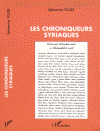 The
writer tells us the Syriac chroniclers' epics,
which, from the IIIrd until the XIVth century, draw the history of
secular and religious events of Eastern. They reported annals, local
histories, chronicles, chronographies. They were the first spectators
of great period for civilisation and let us documents of high importance.
They watched on universe with a different view from the Latin, Greek,
Arab and Mongol's one. Without their eleven chronicles, our vision
of history would be incomplete. The
writer tells us the Syriac chroniclers' epics,
which, from the IIIrd until the XIVth century, draw the history of
secular and religious events of Eastern. They reported annals, local
histories, chronicles, chronographies. They were the first spectators
of great period for civilisation and let us documents of high importance.
They watched on universe with a different view from the Latin, Greek,
Arab and Mongol's one. Without their eleven chronicles, our vision
of history would be incomplete.
Editions
l’Harmattan, Paris, juin 2002, 467 pages.
Scents
of Childhood from Sanate, a Christian village in Iraqi Kurdistan
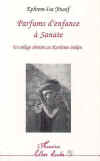 This
tale leads us in a Christian village lost in the mountains of Iraqi
Kurdistan, during 50s. It provides a colourful vision of Assyrian-Chaldeans'
life, and about family, marriage, death, women, particulars cutosms
of this quite unknown people… This
tale leads us in a Christian village lost in the mountains of Iraqi
Kurdistan, during 50s. It provides a colourful vision of Assyrian-Chaldeans'
life, and about family, marriage, death, women, particulars cutosms
of this quite unknown people…
Th teller, Isho, is a young and sensitive boy, and an enthusiastic
witness. Doted with a great memory, he feels himself as the heir of
an ancient history, and the guardian of Aramaic language, already
spoken by Christ. He offered us also his joy and his pains, his wondering
front of Nature, his child's dreams.
Editions l'Harmattan, Paris, 1993
Mesopotamie,
Paradise of Old Days
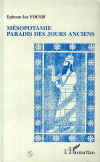 The
writer of this tale, Isho, is a teen ager which
went down from Sanate, a village set up the moutains in Northern Iraq,
for studying in the pittoresque city of Mosul. The
writer of this tale, Isho, is a teen ager which
went down from Sanate, a village set up the moutains in Northern Iraq,
for studying in the pittoresque city of Mosul.
The narrator transport us in 1950s and 1960s, and for discovering
ancient Assyria, as hispassion for its civilisation, its art, language
and religion grew more and more. Prestigious capitals : Assur, Kalhu,
Dur-Sharroukin and Niniveh revived in his heart. He met also the heirs
of a thousand-year-old history living in Christian Syriac cities and
villages, who speak, by tradition, Aramaic, the Christ's language.
But the young man dreams of a new Mesopotamia. Editions
l'Harmattan, Paris, 1996
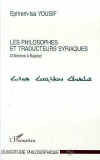 Syriac
philosophers and translators, from Athena to Baghdad Syriac
philosophers and translators, from Athena to Baghdad
The
author tells us the Odysseus of Syriac philosophers who, during more
than thousand years, from the IInd until XIVth century, pursued their
quest of Greek's philosophy, and mainly the Aristotle's one. These
Syriacs were ancient Assyrians, Babylonians, Arameans' heirs. They
spoke Syriac, an idiomatic Aramaic. They translated the Greek philosophical
thinking and provoked, in Near-Eastern and Mesopotamia, its raising
and its success. And the most remarkable fact is that they realized
the transmission of their science to the Arab world. From them, Arabs
took over and passed it in Western.
Editions l'Harmattan, Paris, 1997
The
Epics of Tigris and Euphrat
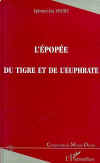 The
writer makes us discovering ancient Mesopotamia and its civilisations,
which bequeathed us an unvaluable inheritage and changed the fate
of mankind. He presents Sumerians, these exceptionnal inventors who
watched universe with a new look They founded the first cities and
built States. with writing, they introduce man in History. Then Akkadians
replaced them and later Babylonians, Assyrians went on to shape the
face of Mesopotamia. Astronomy, astrology, mathematics, law were developped.
The treasures of this land, that we have inherited, is not only ruins
or pieces of museums. They awake our sensibility, our imagination,
and they give us a better knowledge and definition of ourselves. The
writer makes us discovering ancient Mesopotamia and its civilisations,
which bequeathed us an unvaluable inheritage and changed the fate
of mankind. He presents Sumerians, these exceptionnal inventors who
watched universe with a new look They founded the first cities and
built States. with writing, they introduce man in History. Then Akkadians
replaced them and later Babylonians, Assyrians went on to shape the
face of Mesopotamia. Astronomy, astrology, mathematics, law were developped.
The treasures of this land, that we have inherited, is not only ruins
or pieces of museums. They awake our sensibility, our imagination,
and they give us a better knowledge and definition of ourselves.
Editions
l'Harmattan, Paris, 1999
Summary
|